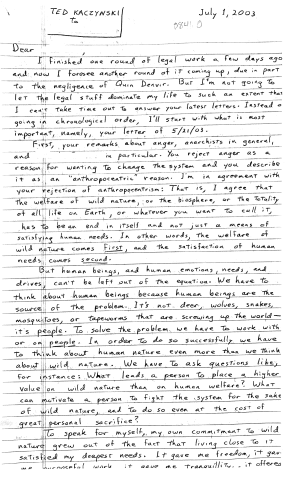Ted Kaczynski
Ted Kaczynski's Letter to an Eco-Centrist
Dear [REDACTED],
I finished one round of legal work a few days ago ... But I'm not going to let the legal stuff dominate my life ...
First, your remarks about anger, anarchists in general, and [REDACTED] in particular. You reject anger as a reason for wanting to change the system and you describe it as an “anthropocentric” reason. I’m in agreement with your rejection of anthropocentrism: That is, I agree that the welfare of wild nature, or the biosphere, or that totality of all life on Earth, or whatever you want to call it, has to be an end in itself and not just a means of satisfying human needs. In other words, the welfare of wild nature comes first, and the satisfaction of human needs comes second.
But human beings, and human emotions, needs, and drives, can’t be left out of the equation. We have to think about human beings because human beings are the source of the problem. It’s not deer, wolves, snakes, mosquitoes, or tapeworms that are screwing up the world—it’s people. To solve the problem we have to work with or on people. In order to do so successfully we have to think about human nature even more than we think about wild nature. We have to ask questions like, for instance: What leads a person to place a higher value on wild nature than on human welfare? What can motivate a person to fight the system for the sake of wild nature, and to do so even at the cost of great personal sacrifice?
To speak for myself, my own commitment to wild nature grew out of the fact that living close to it satisfied my deepest needs. It gave me freedom, it gave me purposeful work, it gave me tranquility, it offered me beauty that no human work of art could remotely approach. It gave me all of those things, and more, as an integrated whole and as a way of life. Consequently, it gave me a sense that life was satisfying and well worth living.
So I came to love wild nature because of what it gave me. You can call that anthropocentric, if you like, but I don’t think anyone becomes committed to nature merely by divine dispensation. I think people become committed to it because of what it has given them. I’ll bet that you yourself became committed to wild nature because of what it gave you.
But when your experience with nature has gone far enough, you acquire a reverence for it and you begin to love it for its own sake, not just for what you get out of it. In other words, you move beyond anthropocentrism. All the same, the process by which you arrive at that point starts with the fulfillment of your human needs through nature.
Furthermore, I think we have to recognize that there are a lot of people who want to get rid of the technoindustrial system for purely anthropocentric reasons, i.e., because the system is bad for human beings. I don’t think we should reject alliances with such people—provided that they are truly committed to getting rid of the system and are prepared to accept the temporary harm to the human race that getting rid of the system will entail.
Even for those who have moved beyond anthropocentrism it’s easy to say, “There’s nothing I can do”, then give up and take a passive, resigned attitude. Many people who love nature do exactly that. And you can’t say their attitude is irrational. It is extremely difficult to fight the system; one has to work against long odds. So why bother? What would motivate someone to keep fighting against such odds?
I can tell you what motivates me to keep fighting: Anger. And I have a pretty strong suspicion that anger has a lot to do with your will to keep fighting, too. The difference between you and the anarchists is that your anger is controlled and is a productive source of energy and determination, whereas most American anarchists (at least, most of the ones that I know anything about) are unthinking, disorganized people who are seriously deficient in self-control. Their anger comes out in senseless, random ways. They do stupid things like smashing windows at McDonald’s, or swearing and playing loud music just to annoy people. They pretend to be revolutionaries, but as serious revolutionaries most of them are useless. (Of course, there are exceptions.)
Like you, I’m disgusted by these people, and I think the majority of them are beyond redemption. They will never learn, because they simply do not have the capacity for self-control.
As for [REDACTED], I don’t know what he’s written to you (aside from the few quotes you included in your letter), but on the basis of what he’s written to me I’d say that he is bright, willing to learn, and potentially capable of self-control. I would guess that the reason why he blurts out angry thoughts without restraint is, at least in part, that he has spent too much time hanging out with anarchists and has acquired their bad habits. I think we can teach him to keep his anger under control, direct it intelligently, and use it as a productive source of energy. It’s possible that I’m wrong, but there’s only one way to find out, and that’s by trying.
* * *
Now, regarding Deep Ecology for the 21st Century: For several years, until maybe a year ago, I had a copy of it here with me. I read only a part of it—much less than half—and I didn’t like what I read. I kept the book around mainly because I wanted to write a criticism of it, but I never had time, and eventually I got rid of it to make room for other books.
I don’t remember exactly what parts of Deep Ecology I read, but I do know that among other things I read an essay by Arne Naess. I’ll tell you why I didn’t like it, but bear in mind that I’m relying on my memory of what I read several years ago, and my memory could be wrong. So if any of my criticisms are off the mark due to errors of memory, please correct me. Also, if you like, you can clarify matters for me by sending me some pages of photocopies from the book. (The copies will probably be allowed to reach me.)
Now, if I remember correctly, Arne Naess, the founder of Deep Ecology, says something along these lines:
Deep Ecology is a philosophy that gives the welfare of the worldwide ecosystem (call it wild nature if you like) priority over human welfare. Nevertheless, he says that when it is necessary to compromise the welfare of wild nature in order to save human lives, this should be done because (according to Naess) every species has to look out for its own. Moreover, it seems clear that Naess has in mind a kind of stewardship role for the human race: The human race is supposed to look after other species and keep the world ecosystem healthy. The philosophy of Deep Ecology is expected to spread slowly; according to Naess it will take hundreds of years to become dominant. Naess nowhere suggests that modern industrial society should be done away with. And he nowhere offers any clear, definite, concrete, overall goal for adherents of Deep Ecology.
To mention the most obvious criticism first, reliance on a philosophy that is expected to take hundreds of years to spread is idiotic, because hundreds of years from now there will be little, if anything, left to save.
Second, Naess’s position that human lives must be preserved even, when necessary, at the cost of damage to the ecosystem, is inconsistent with his position that the welfare of the ecosystem is to take precedence over human welfare. If the welfare of the world ecosystem is put before human welfare, a lot of people are going to die as a result. We know that economic growth and so-called “progress” are ruining wild nature. If wild nature is to be saved, then this growth-and-progress disease has to be stopped, and stopped as soon as possible. The consequences of stopping it will be disastrous: As any economist will tell you, if you turn economic growth into economic shrinkage, the whole economy of the world will go to hell. There will be massive unemployment, acute shortages of commodities, consequently a breakdown of social order and in many parts of the world armed rebellions and wars. Even now there is a lot of that kind of thing going on in the world. If the world economy breaks down, the situation will get a heck of a lot worse. See the Manifesto, paragraphs 111, 167, 194. Hence, getting rid of the growth-and-progress disease will probably lead to massive loss of human life; which according to Naess’s philosophy should not be allowed to happen. Thus, the asserted need to protect human life will prevent Deep Ecologists from taking measures drastic enough to get us out of the hole we’re in.
Next, Naess’s position that the human race is to exercise a kind of stewardship over the natural world implies in practice that the human race is to remain dominant over the rest of the world ecosystem; the only real change proposed by Naess is that humans hereafter are supposed to exercise their power over nature benevolently and with restraint rather than in the current ruthlessly exploitative manner.
I personally am not under any circumstances willing to accept that human society should remain dominant over wild nature. But even if you don’t find human dominance over nature objectionable in itself, you certainly should find the consequences of it objectionable: Naess’s belief that human society can retain its power over nature, yet exercise that power with benevolence and restraint, is completely unrealistic. It’s just not going to happen. The philosophy of Deep Ecology is never going to govern the development of our society.
Naess has fallen into an extremely widespread error, namely, the belief that you can guide or direct the development of a society by setting up a code, principles, a philosophy or the like by which people are supposed to govern their behavior. History has shown that you can’t control the development of a society. See Manifesto, paragraph 99-109. Least of all can you control the development of a society by introducing a philosophy or a set of principles. It’s been tried again and again and it has never succeeded. The Russian revolutionaries tried to set up a society governed by their idealistic socialist principles, and we all know how that worked out. The early Christians made equality, peace, justice and so forth their principles, but as soon as they had a chance to cut a deal with the emperor Constantine they sold out. Later, after the fall of Rome and through the Middle Ages, the supposedly gentle Christian religion presided over a particularly violent epoch of European history. Islam, too, began with principles of equality and justice, but it turned out no better than Christianity did: “At the end of the rule of the ‘rightly guided’ caliphs, the Prophet’s dream of ushering in a new era of equality and social justice remained unfulfilled… .”[1] The French revolutionaries failed utterly to set up a new society that accorded with their ideals. The Latin American revolutionaries similarly failed in their attempt to incorporate their principles in a new form of society. At the end of his life, Bolívar wrote in discouragement that “he who serves a revolution plows the sea.”[2] (It was true that the Latin American revolutionaries “plowed the sea” in the sense that they failed to set up the new order of which they dreamed, but they did succeed in destroying the old order.[3])
One could go on and on listing such examples. Attempts to impose principles on a society always fail. The typical pattern is that idealistic revolutionaries commit themselves to certain principles, and often do remain faithful to those principles. But once the revolution achieves power and the first, idealistic generation of revolutionaries dies off (or even before that), those who are more interested in power than in principles gain control of the situation. The principles are then abandoned, twisted, or reinterpreted so that they no longer serve the purposes of the original, idealistic revolutionaries. That’s what happened with Christianity, Islam, the various communist revolutions, the Latin American revolutions, the Reformation, and the twentieth-century revolts against colonialism (look how Africa, for example, has turned out).
The same thing will happen with Deep Ecology. As long as it is an ideology of outsiders, of an idealistic minority, its adherent may remain faithful to its principles. But if it ever becomes the dominant ideology in society its principles will be distorted or reinterpreted so that they become ineffective. That is what always happens.
Thus, Naess’s proposal to change society through propagation of Deep Ecology philosophy is nothing but a pipe-dream. Any attempt to guide the development of a society through the introduction of philosophical principles, to which people are supposed to remain faithful for centuries, is a pipe-dream. People may continue to pay lip-service to the principles, but the majority will not in practice govern their behavior according to the principles over any extended period.
However, as I’ve pointed out, the initial, idealistic generation of revolutionaries often does remain faithful to its principles. So we have to ask what that initial generation of revolutionaries can do that will have a long-lasting effect without need for later generations to continue faithful to the revolutionary principles. In our case the answer to that question is clear: The revolutionaries must destroy the technoindustrial system. Even though revolutionary movements never succeed in permanently establishing the new order that they dream of, they have often succeeded in destroying the old order of a society. Thus, historical precedents suggest that it may be feasible for a revolutionary movement to destroy the technoindustrial system.
Deep Ecology is not merely futile. It actually impedes the formation of a genuine revolutionary movement because it offers an easy way out: All we have to do is preach the philosophy and engage in little reformist actions, nobody gets hurt, nobody has to take any big risks, and everything will turn out alright. Supposedly. In this way Deep Ecology serves as a kind of decoy that draws people and energy into efforts that in the long run are futile. So Deep Ecology drains away people and energy that might otherwise contribute to the formation of a genuine revolutionary movement. The same is true of any ideology that stops short of advocating the complete abolition of modern industrial society. That’s why we have to distance ourselves from all such ideologies.
Another problem with Deep Ecology: As far as I can recall, Arne Naess proposes no concrete, clearly-defined, overall goal for Deep Ecologists. That in itself is probably enough to guarantee the failure of Deep Ecology. Vaguely defined goals such as freedom [BOTTOM OF LETTER IS CUT OFF]... (in this case) “Deep Ecology” are useless, because people simply reinterpret vaguely-defined goals to suit their own needs of the moment. An experienced community activist has written: “Vague, over-generalized objectives are seldom met. The trick is to conceive of some specific development that will inevitably propel your community in the direction you want it to go.”[4] Such a specific development is an end to modern technology. When we say that there are to be no more computers, no more cars, no more electrical power-grid, etc., etc., that is sufficiently clear and unambiguous so that there can be no doubt as to what is meant. It’s a goal that can’t be reinterpreted out of existence. As far as I know, Deep Ecology has no such clear, definite, unmistakable goal.
Yes another problem with Deep Ecology is its leftish aroma. You yourself pointed out, in different words, that it has such an aroma. Why is this important? Because the aroma draws leftists. For present purposes we can define leftists as people who are habitually attracted to causes. They don’t care what the cause is—any cause will do as long as it’s not flatly inconsistent with left-wing ideology. That’s why you get people who are involved in a dozen different causes at the same time. (For example, [REDACTED]; see Earth First!: Environmental Apocalypse, page 110.) They don’t really care about any of these causes, because their real motive is not to bring about any particular change in society, but to satisfy their own psychological needs through participation in a movement. See Manifesto, paragraphs 213-226. These people are extremely numerous in our society, and they come swarming to any cause like flies to a fresh turd. You know what they did to Earth First!, and they’ll do the same thing to us unless we work hard to prevent it. We have to be especially careful to avoid anything that has a leftish aroma which would attract these people. That by itself would be enough to make me leary of any association with Deep Ecology.
* * *
I'd better quit here or this letter will go on forever. I'll write more later.
I would be interested to hear anything further you might care to tell me about your experiences in North Carolina.
I sent you letters dated 5/17/03 and 6/17/03. I hope you got them.
Very best regards,
Ted
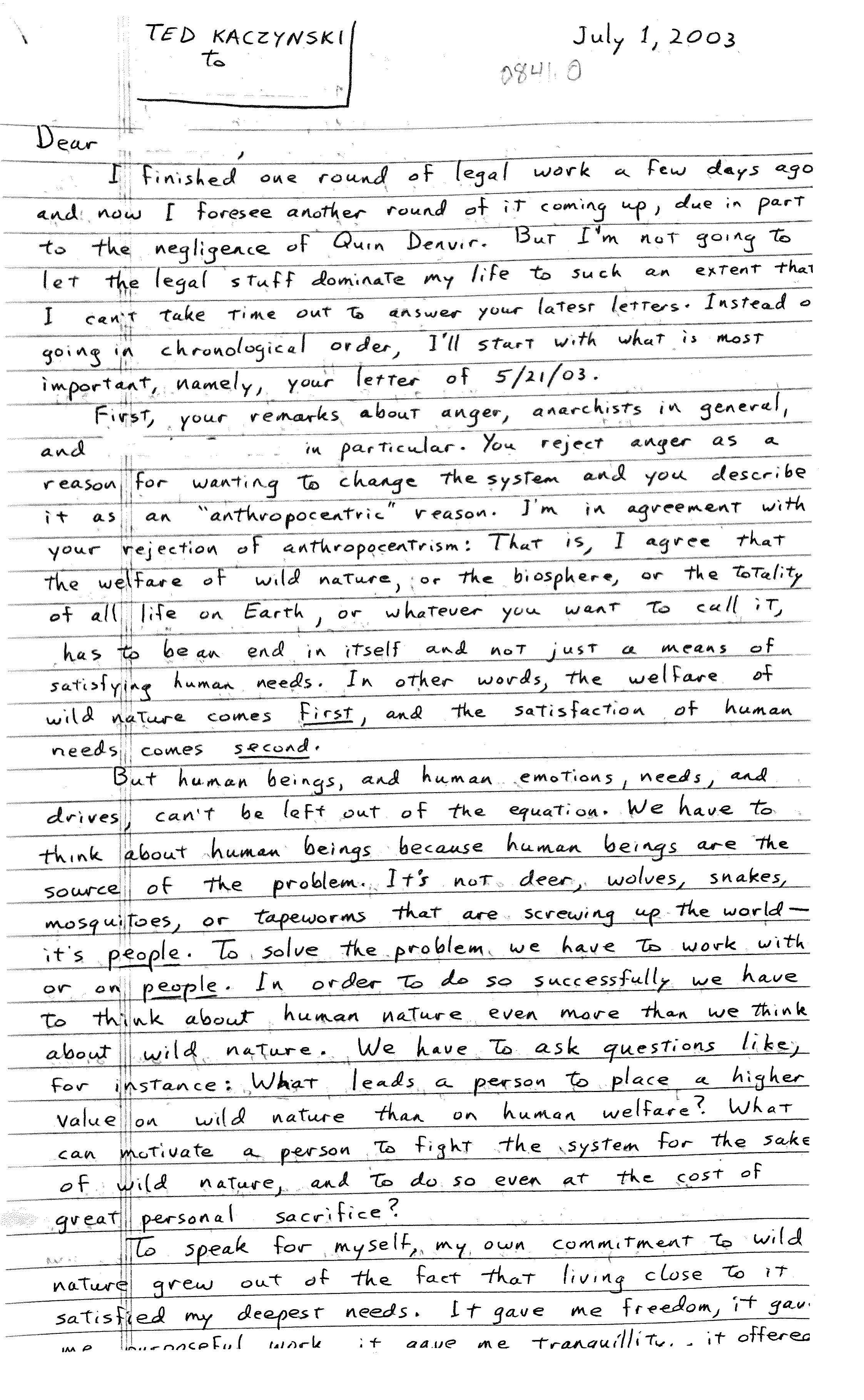


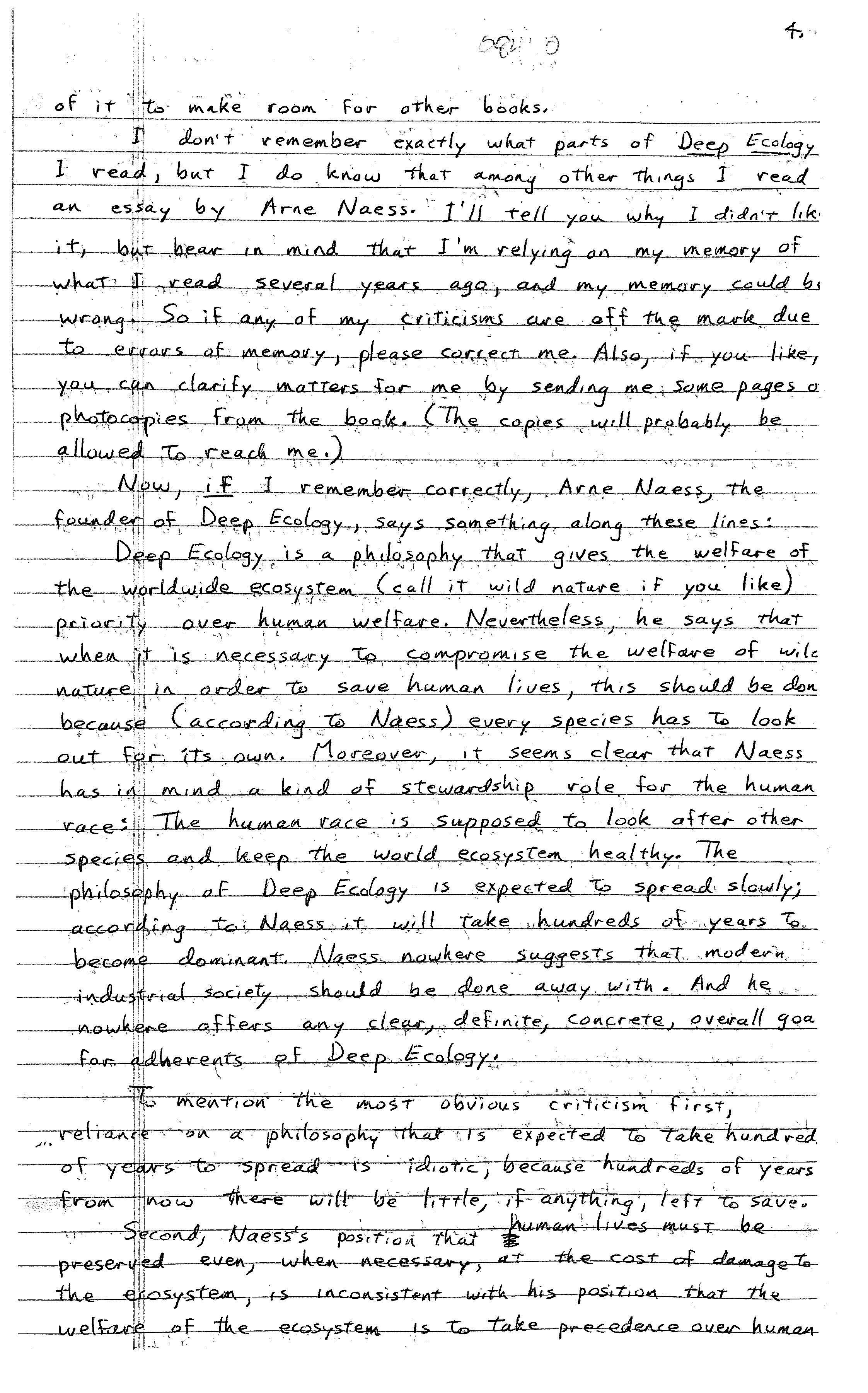


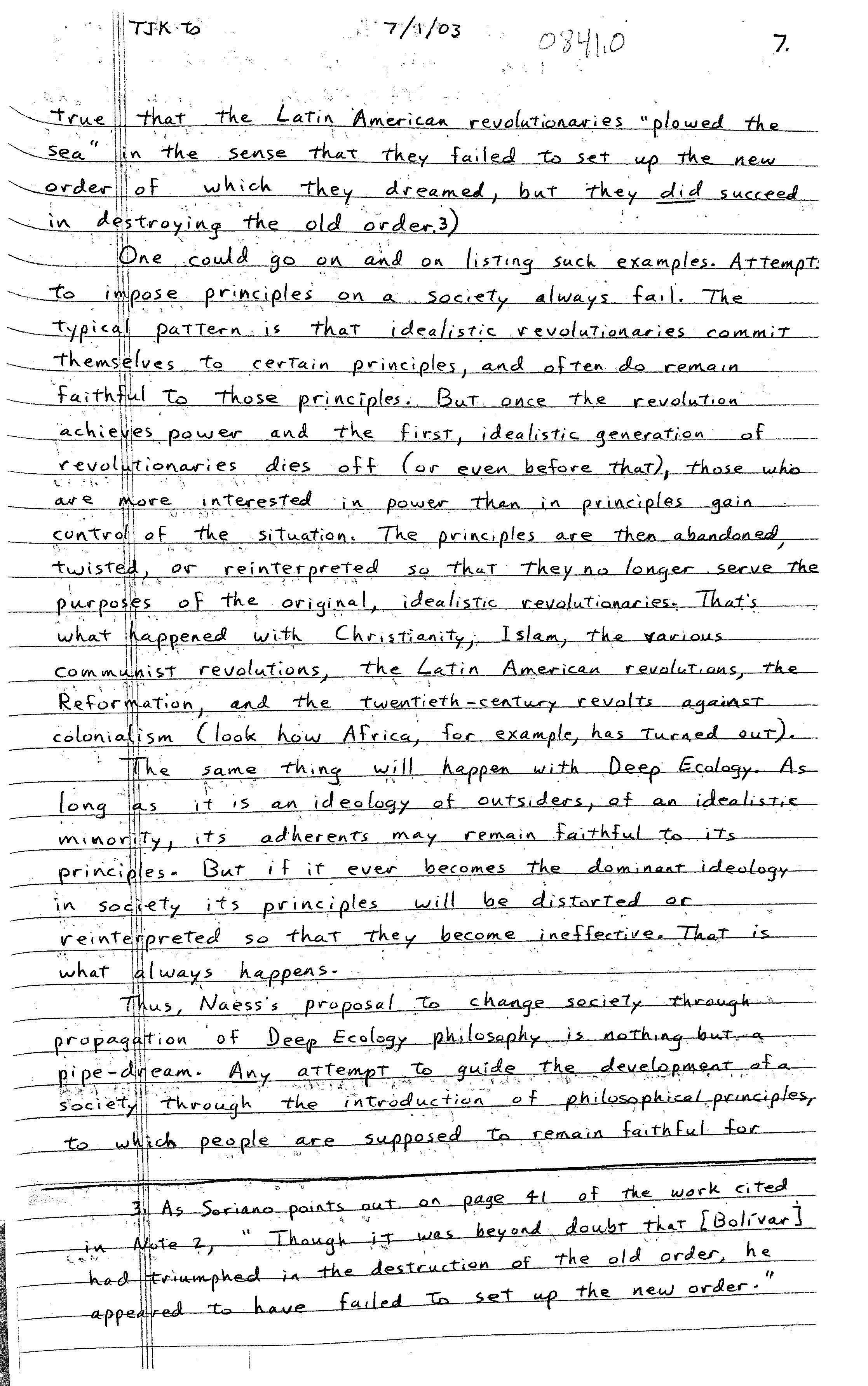
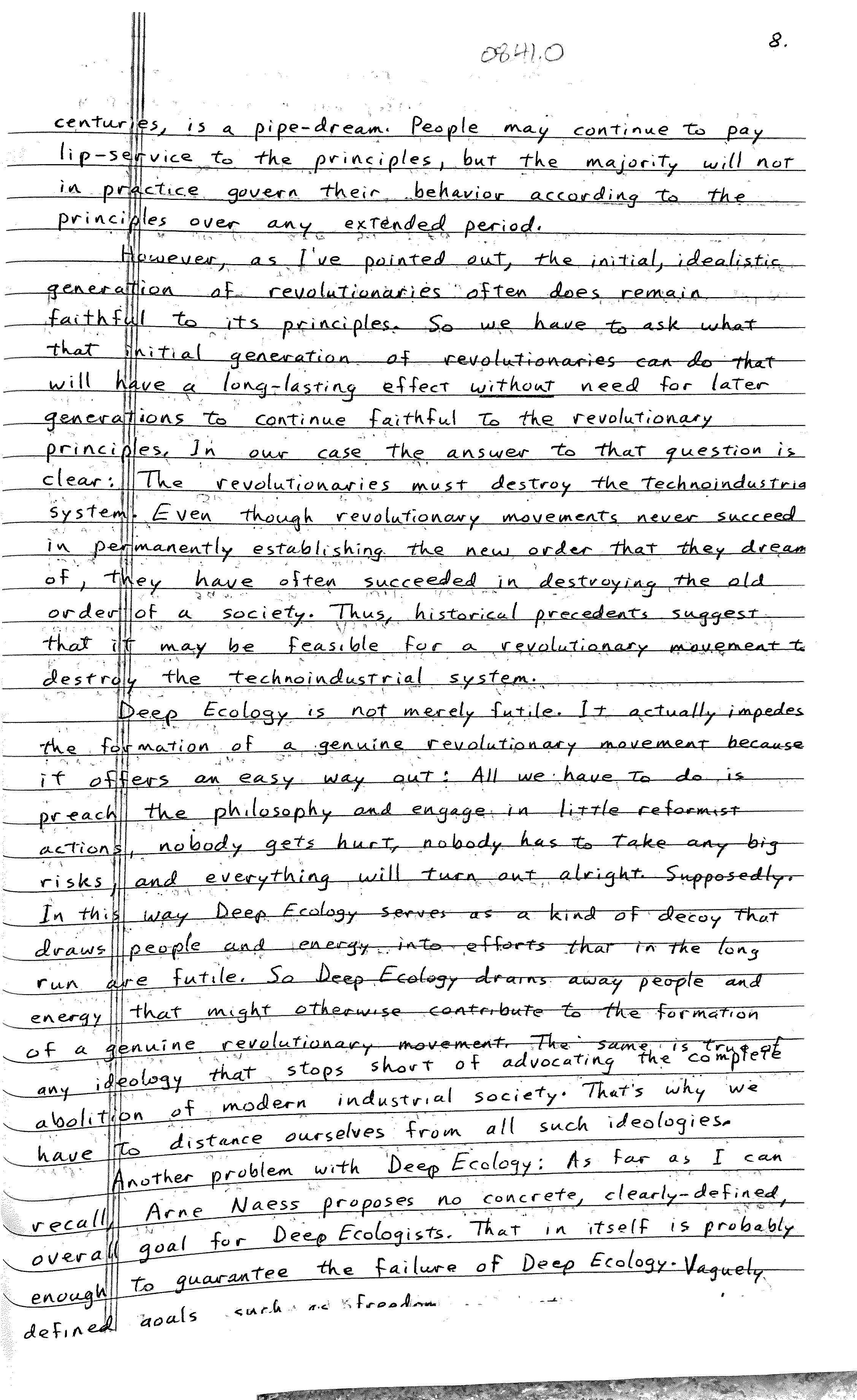


[1] Rafiq Zakaria, The Struggle Within Islam, Penguin Books, London, 1989, page 59.
[2] Simón Bolívar, Escritos políticos, edited by Garciela Soriano, Alianza Editorial. Madrid. 1975 page 169.
[3] As Soriano points out on page 41 of the work cited in Note 2, “Though it was beyond doubt that [Bolívar] had triumphed in the destruction of the old order, he appeared to have failed to set up the new order.”
[4] John Huenefeld, The Community Activist’s Handbook, Beacon Press, Boston, 1970, page 6.


